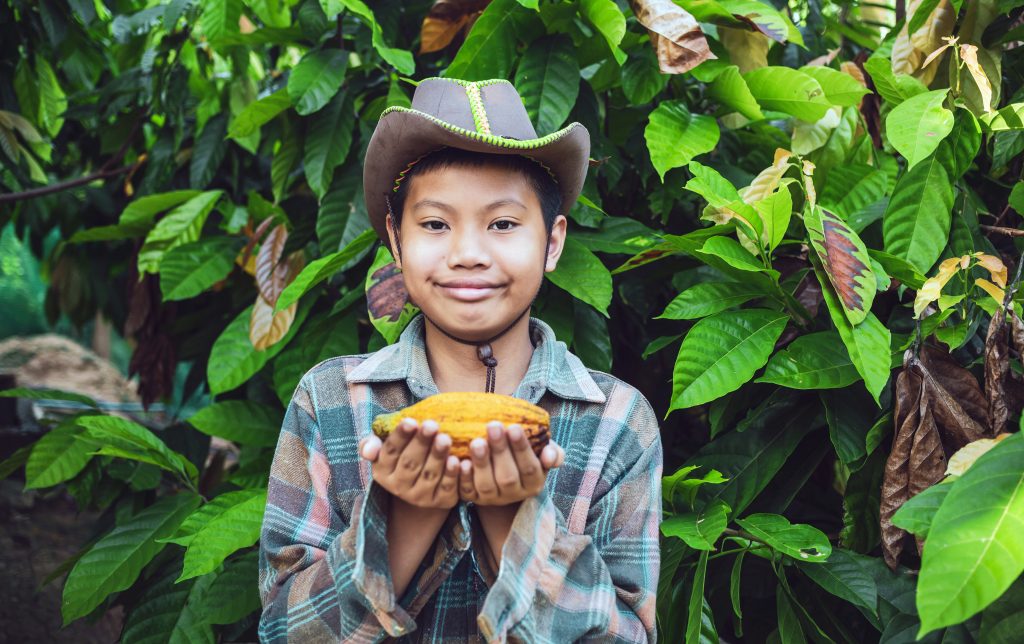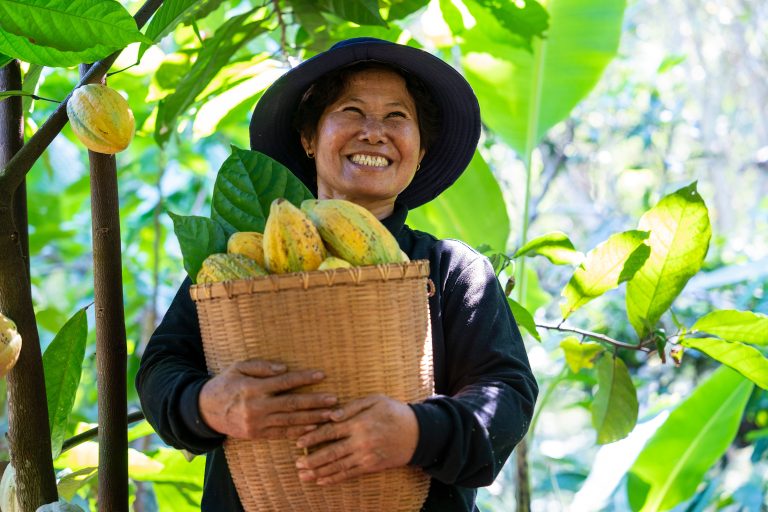When chocolate isn’t so sweet: modern slavery and child labour in the cocoa industry
As the cooler months set in, many of us curl up with those warming cups of hot choc, but arguably most of us don’t think of the supply chain of this ubiquitous treat. Modern slavery and child labour often feels like problems happening overseas; however, the end results can be found in everyday consumer products on Australian supermarket shelves, and pantries across the country. Every year, we import almost $1 billion of cocoa and cocoa products, and the average Aussie consumes 5kg of chocolate; while the slavery in cocoa supply chains is mostly happening outside our borders, we’re certainly complicit in it.
Of course, the extent of slavery in cocoa supply chains isn’t obvious at first glance; it’s hardly going to be found on a label. Individual consumers operate with limited information. Modern slavery and child labour both lurk in the shadows, generally deep into supply chains that remain unmapped and unknown even by the Australian food businesses producing chocolate products. However, where this status quo is left unchecked, it represents potentially massive human rights violations. much as possible.
Human rights violations in the cocoa industry
Where does responsibility lie in this matter? This is a complex question with no single answer. Regardless of good intent, consumers will generally have little idea of what the supply chain looks like, and often have little ability to make better choices. Consumers widely agree that they would pay more for an ethically-sourced product, but where are those products? Companies like Nestle have pledged to eradicate child labour in their supply chains, but as we’ve seen from high-profile litigation, their supply chains have also been contaminated. Not in an office here in Australia, but in faraway cocoa farms in the developing world. Whether they have taken reasonable steps to avoid child labour in their supply chains is up for debate – and is currently being debated in a landmark child slavery lawsuit in the US. Nestle can only trace 49 percent of its global cocoa supply to farms; Mars can trace a mere 24 percent. If chocolate manufacturers do not know where their chocolate is coming from, how can consumers?
Roughly two-thirds of the world’s cocoa supply comes from West Africa, where at least 2 million children are engaged in dangerous labour in cocoa-growing regions. Many of these child labourers are working on farms owned by their parents, a human rights violation in of itself; furthermore, a significant number of adults and children as young as 5 are trafficked to work in the cocoa fields, experiencing horrific conditions and abuse. The odds are that the chocolate bars we buy in our supermarkets are tainted by child labour and/or modern slavery, because by the time one reaches those cocoa farms, these practices are so very pervasive.
Cocoa industry has “the power to end child labour and slave labour”
The Food Empowerment project argues that “despite their role in contributing to child labour, slavery, and human trafficking, the chocolate industry has not taken significant steps to remedy the problem… within their $60-billion industry, chocolate companies have the power to end the use of child labour and slave labour by paying cocoa farmers a living wage for their product.” Certified chocolates offer a somewhat better, but still limited alternative, with three nonprofit groups — Fairtrade, Utz and Rainforest Alliance — providing labels to products that have been produced according to their ethical standards, including a prohibition on child labour. However, third-party inspectors are required to visit fewer than 10 percent of cocoa farms (Washington Post). This isn’t to say that these groups aren’t doing significant work in improving the lives of cocoa industry workers, particularly by ensuring that producers are paid fairly for this commodity. On average, cocoa farmers earn less than $2 per day, an income below the poverty line, and often resort to the use of child labour to keep their prices competitive (Food Empowerment Project); paying fair prices to cocoa farmers reduces these pressures, but does not necessarily guarantee that these benefits are passed on to the workers. As such, more needs to be done at an industry level not only to further empower these organisations, but to prevent adults and children alike from slipping through the cracks.
“We haven’t eradicated child labor because no one has been forced to. What has been the consequence . . . for not meeting the goals? How many fines did they face? How many prison sentences? None. There has been zero consequence.” – Antonie Fountain, managing director of the Voice Network
The cocoa industry certainly leaves a bitter taste: this is a well-known high-risk industry for modern slavery, including child labour, which has attracted international condemnation for decades for harmful practices. The industry itself is widely considered to not be doing enough to prevent child labour and modern slavery, with some of the largest companies in the world purchasing cocoa from markets where child labour and slavery remain rife; in particular, a recent report by Macquarie University has revealed that major chocolate producers including Nestle, Hershey, Mondelez (which owns Cadbury) and Mars are still sourcing cocoa from the Ivory Coast.
“Nestle and the other industry players have not resolved the issue. They are overstating good news and understating bad news.” – Professor John Dumay, Macquarie University (The New Daily: Child slavery: Why your choice in chocolate could be harming children)
The report finds that “large companies may create the impression they are doing the right thing by workers and the environment when in fact their businesses may be involved in exploitative and harmful practices”; marketing messages of these large companies may be quite different from on-the-ground realities. Australian consumers can to some extent dollar-vote by choosing certified chocolates, but this remains far from perfect; real change needs to happen at an industry level. Furthermore, companies dealing with cocoa must tread with care to avoid being complicit in these practices, to avoid not only ethical and reputational risk, but also risk of litigation.
Australia’s Modern Slavery Act
Government policies worldwide are increasingly compelling businesses to take reasonable steps to prevent modern slavery in their supply chains, including Australia’s Modern Slavery Act which requires large companies both to take these reasonable steps and report on these efforts. While smaller companies are not subject to the same stringent reporting requirements, the choices that they make in where they source their cocoa and chocolate remain invaluable in pressing for change in the industry by creating demand for certified products. However, the most important changes must happen at the top. Ethical sourcing is best achieved through collaborative efforts and knowledge-sharing, commitment to meaningful change, and optimal use of expertise, data and partnerships at an industry level.
Ethical sourcing collaboration, powered by tech
By way of example, the Australian Property Council is leading a collaborative group of the 17 largest property companies in developing a tech platform powered by Informed 365, that gathers and collates information from industry suppliers on their modern slavery exposures in operations and supply chain. The companies use our platform to more effectively map complex, multinational supply chains. The platform also empowers suppliers to assess their risk exposure as well as managing and monitoring processes. You can find more information on that project here. Coordinated, collaborative efforts such as these have proven effective across many industries, enabling the best possible approaches to the complex and opaque problems of modern slavery and child labour.
Furthermore, the clarion call for stronger penalties for modern slavery and child labour in supply chains is louder than ever, with many calling for government intervention – for example, more robust modern slavery legislation.
Nothing changes if nothing changes
The international cocoa industry is still going strong despite enormous human rights violations that have been known for at least a century, since William Cadbury first sent Dr. Joseph Burtt to investigate conditions on the cocoa plantations of on the islands of São Tomé and Principe. As Albert Einstein’s famous quip put it, “insanity is doing the same thing over and over again expecting different results”; nothing changes if nothing changes, and where pleading ignorance is enough to avoid consequences, it seems unlikely that much will. As such, many anti-slavery activists are watching the Nestle and Cargills cases closely; these landmark cases may perhaps finally lead to change.
But in the meanwhile, while children grow up in conditions unimaginable to Australian families, the onus is on Australian companies dealing with cocoa to make more ethical choices; while Australian consumers can avoid taking claims of ethical sourcing at face value and dollar-vote with care as they grow the demand for certified cocoa, and the capacity of certification bodies to do their work better in turn.
From fashion to fish, chocolate to construction, many sectors that Australians companies work within are exposed to modern slavery. Explore issues pertaining to modern slavery, ethical sourcing and supply chain management at the Informed 365 blog; and to learn more about how we empower companies in Australia and beyond towards better supply chain management & modern slavery reporting, and turn their ESG and CSR commitments into practice, contact us.









